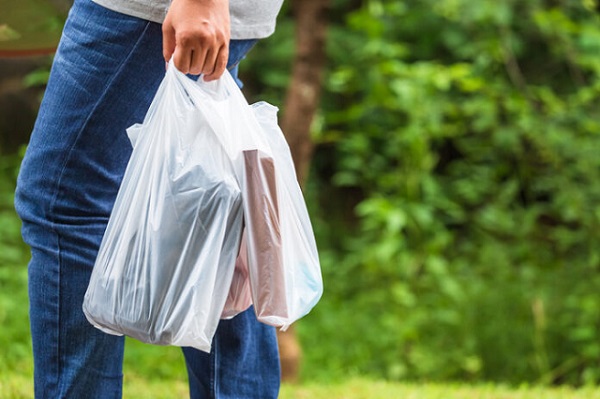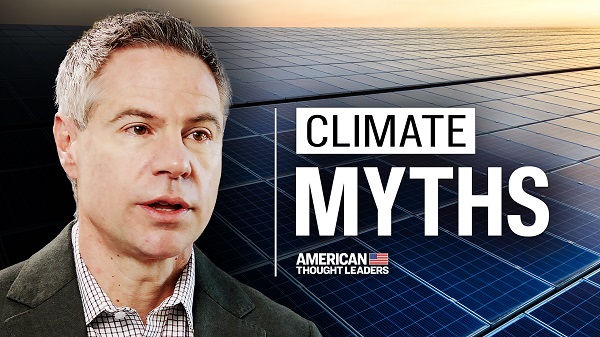Environment
Ottawa’s plastic ban may actually hurt the environment

From the Fraser Institute
” a market research firm, found that in New Jersey… “non-woven polypropylene… consumes over 15 times more plastic and generates more than five times the amount of GHG emissions during production per bag than polyethylene plastic bags.” In other words, the ban helped increase pollution. “
Despite a court ruling late last year, which deemed the Trudeau government ban on single-use plastic (cutlery, straws, grocery bags, etc.) “unreasonable and unconstitutional,” the ban essentially remains in place pending appeal or further regulatory action. But according to the government’s own data and analysis, plastic waste is a virtual non-issue in Canada, as 99 per cent of all plastic waste is disposed of safely in landfills or is incinerated. And less than 1 per cent of Canada’s plastic waste finds its way into the environment.
Moreover, there’s great potential for people to replace banned plastic items, including plastic grocery bags, with other plastic bags not included in the ban such as heavy gauge “reusable” shopping totes and other types of plastic trash bags made of heavier-gauge plastics than the filmy bags banned from grocery stores.
In New Jersey, for example, while plastic grocery bag use did decline following a statewide ban in 2022, plastic substitute materials skyrocketed, plastic consumption rose threefold for heavier reusable bags and sixfold for woven and non-woven polypropylene bags, which are not produced domestically, not recycled nor do they contain recycled content. Freedonia, a market research firm, found that in New Jersey “increased consumption of polypropylene bags” contributed to a “500% increase in greenhouse gas (GHG) emissions compared to non-woven polypropylene bag production” and that “non-woven polypropylene… consumes over 15 times more plastic and generates more than five times the amount of GHG emissions during production per bag than polyethylene plastic bags.” In other words, the ban helped increase pollution.
In California, an environmental interest group called CALPIRG recently issued a report generally favouring plastic bag bans, observing that they do indeed reduce the use of banned bags. However, the report notes that “loopholes,” which allow consumers to use heavier plastic bag alternatives, results in more plastic consumption and waste—not less. According to CALPIRG, plastic bag disposal rates increased in one jurisdiction (Alameda) from 157,000 tons in the year before the ban on single-use grocery bags to 231,000 tons in 2021. On a per-person basis, it rose from 4.1 tons disposed of per 100,000 people to 5.9 tons disposed of per 100,000 over that same span.
In both New Jersey and California, efforts are underway to “fix” the loopholes that have allowed proliferation of plastic consumption and waste in the wake of plastic bag bans. However, these actions are unlikely to work unless they can somehow stop consumers from simply switching to plastic garbage bags or buying online heavier-gauge plastic shopping totes (and trashing them after a few shopping trips). Consumers have already shown they’re prepared to do these things.
Here at home, there’s no reason to believe that Canadian consumers will react any differently to a ban on single-use plastics. Canadians are just as likely to reach for the convenient substitute, whether that’s heavier paper products or heavier plastic products not covered under existing bans.
If sanity reigned, Canada would get ahead of the perverse consequences likely to flow from plastic bans by scrapping the entire idea and allowing consumers to consume what they believe best suits their lives and pocketbooks. Canada already has an admirable waste management system that keeps 99 per cent of disposed plastics safely locked away in environmentally protective landfills or eliminates them completely through incineration.
There’s no need for plastic bans or a governmental takeover of the plastics sector via regulation. Government should throw these bans in the bin.
Author:
Business
Canada is failing dismally at our climate goals. We’re also ruining our economy.

From the Fraser Institute
By Annika Segelhorst and Elmira Aliakbari
Short-term climate pledges simply chase deadlines, not results
The annual meeting of the United Nations Conference of the Parties, or COP, which is dedicated to implementing international action on climate change, is now underway in Brazil. Like other signatories to the Paris Agreement, Canada is required to provide a progress update on our pledge to reduce greenhouse gas (GHG) emissions by 40 to 45 per cent below 2005 levels by 2030. After decades of massive government spending and heavy-handed regulations aimed at decarbonizing our economy, we’re far from achieving that goal. It’s time for Canada to move past arbitrary short-term goals and deadlines, and instead focus on more effective ways to support climate objectives.
Since signing the Paris Agreement in 2015, the federal government has introduced dozens of measures intended to reduce Canada’s carbon emissions, including more than $150 billion in “green economy” spending, the national carbon tax, the arbitrary cap on emissions imposed exclusively on the oil and gas sector, stronger energy efficiency requirements for buildings and automobiles, electric vehicle mandates, and stricter methane regulations for the oil and gas industry.
Recent estimates show that achieving the federal government’s target will impose significant costs on Canadians, including 164,000 job losses and a reduction in economic output of 6.2 per cent by 2030 (compared to a scenario where we don’t have these measures in place). For Canadian workers, this means losing $6,700 (each, on average) annually by 2030.
Yet even with all these costly measures, Canada will only achieve 57 per cent of its goal for emissions reductions. Several studies have already confirmed that Canada, despite massive green spending and heavy-handed regulations to decarbonize the economy over the past decade, remains off track to meet its 2030 emission reduction target.
And even if Canada somehow met its costly and stringent emission reduction target, the impact on the Earth’s climate would be minimal. Canada accounts for less than 2 per cent of global emissions, and that share is projected to fall as developing countries consume increasing quantities of energy to support rising living standards. In 2025, according to the International Energy Agency (IEA), emerging and developing economies are driving 80 per cent of the growth in global energy demand. Further, IEA projects that fossil fuels will remain foundational to the global energy mix for decades, especially in developing economies. This means that even if Canada were to aggressively pursue short-term emission reductions and all the economic costs it would imposes on Canadians, the overall climate results would be negligible.
Rather than focusing on arbitrary deadline-contingent pledges to reduce Canadian emissions, we should shift our focus to think about how we can lower global GHG emissions. A recent study showed that doubling Canada’s production of liquefied natural gas and exporting to Asia to displace an equivalent amount of coal could lower global GHG emissions by about 1.7 per cent or about 630 million tonnes of GHG emissions. For reference, that’s the equivalent to nearly 90 per cent of Canada’s annual GHG emissions. This type of approach reflects Canada’s existing strength as an energy producer and would address the fastest-growing sources of emissions, namely developing countries.
As the 2030 deadline grows closer, even top climate advocates are starting to emphasize a more pragmatic approach to climate action. In a recent memo, Bill Gates warned that unfounded climate pessimism “is causing much of the climate community to focus too much on near-term emissions goals, and it’s diverting resources from the most effective things we should be doing to improve life in a warming world.” Even within the federal ministry of Environment and Climate Change, the tone is shifting. Despite the 2030 emissions goal having been a hallmark of Canadian climate policy in recent years, in a recent interview, Minister Julie Dabrusin declined to affirm that the 2030 targets remain feasible.
Instead of scrambling to satisfy short-term national emissions limits, governments in Canada should prioritize strategies that will reduce global emissions where they’re growing the fastest.

Elmira Aliakbari
Environment
The Myths We’re Told About Climate Change | Michael Shellenberger

Why is it, I asked him, that Bill Gates recently rejected “doomsday” predictions and started calling for a more pragmatic, human-centered approach?
From rising sea levels to surging forest fires to dying polar bears to disappearing coral reefs, much of what we’ve been told about climate change is not true, he says.
The rising sea level narrative, for example, rests entirely on computer models that were manipulated to produce the desired outcome, Shellenberger says.
“It’s clear that the activist scientists were manipulating models to show an acceleration in sea level rise when the only long-term, reliable source of data, which is called tide gauge data…shows no acceleration from the 1850s on,” he says.
How is data cherry-picked or skewed to create misleading narratives? What’s behind the sudden embrace of nuclear energy—after it had been demonized for decades? How might it be related to the global AI race?
-

 Alberta1 day ago
Alberta1 day agoFrom Underdog to Top Broodmare
-

 Energy2 days ago
Energy2 days agoPoilievre says West Coast Pipeline MOU is no guarantee
-

 Alberta2 days ago
Alberta2 days agoCarney forces Alberta to pay a steep price for the West Coast Pipeline MOU
-

 Business1 day ago
Business1 day agoHigher carbon taxes in pipeline MOU are a bad deal for taxpayers
-

 Energy2 days ago
Energy2 days agoWill the New West Coast Pipeline MoU Lead to Results? Almost Certainly Not According to AI
-

 Alberta1 day ago
Alberta1 day agoREAD IT HERE – Canada-Alberta Memorandum of Understanding – From the Prime Minister’s Office
-

 Business1 day ago
Business1 day agoMan overboard as HMCS Carney lists to the right
-

 COVID-192 days ago
COVID-192 days agoCanadian government seeking to destroy Freedom Convoy leader, taking Big Red from Chris Barber












